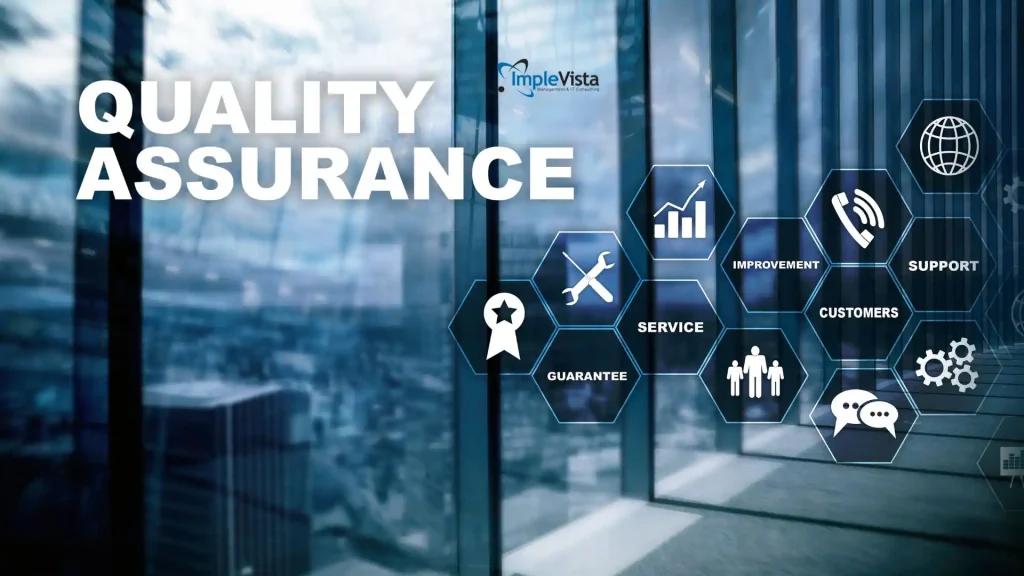In the global and rapidly changing environment, where technology and consumers’ needs and wants are constantly evolving, the success of every software development project is deeply rooted in producing high-quality software. In this regard, quality assurance in software development has a central role.
Implevista strongly agrees that quality can never be overemphasized, particularly in software development. QA also guarantees that businesses can release robust and secure applications that customers will find intuitive in competitive markets by performing rigorous testing, finding bugs early, and constantly enhancing the development processes.
What is Quality Assurance in Software Development?
Quality assurance in software development is a generic term used to encompass planned and systematic efforts that focus on certifying software against given quality standards. It is not a simple test but a preventive procedure incorporated into the software development life cycle.
Quality assurance in software development is a step-by-step evaluation process that checks and reduces or eliminates risks at every stage of development, from the client’s requirements to the final application release.

The Importance of Quality Assurance in Software Development
Enhanced Customer Satisfaction: Many people do not like to work with software that has many glitches, freezes, and performance problems. At the same time, high-quality software provides users with a smooth and entertaining experience. Happy customers are more likely to become constant software users, advocate for the software to other potential users, and provide insights on how the software can be enhanced.
Reduced Costs: It is much cheaper to find and address the bugs during the quality assurance in software development than to rectify them after the software launch. Whenever an issue arises in fixing that particular bug, it quickly takes a few hours to fix it when it is done in the development phase. However, if the bug reaches the production level, it results in time wastage, loss of essential data, and customer dissatisfaction.
Improved Brand Reputation: Delivering programs full of glitches is exceptionally deleterious to a firm’s image. Customers’ confidence in the company’s ability to provide quality products diminishes, and unfavourable comments can soon go viral. Quality assurance in software development assists in keeping the brand’s image positive because only quality software is allowed into the market.
Increased Efficiency: To derive maximum benefits from QA, the process needs to be incorporated right from the beginning. This will rectify all the problems early and thus facilitate faster and more efficient development. This helps avoid numerous costly delays, eliminates most of the need to get back to square one, and boosts the efficiency of completing projects.
Enhanced Security: Security is one of the most vital concerns in the modern world. Quality assurance in software development is essential in categorizing and managing issues related to security, such as data leakage and virus invasions. Overall, QA contributes to the company and user protection whenever it runs comprehensive security testing to secure the software.
Competitive Advantage: In today’s highly competitive environment, bringing high-quality software products to the market becomes increasingly important. Users are more and more concerned with quality and easy-to-use software. From the software experience point of view, any company that produces outstanding software experiences can create a competitive advantage and foster customer loyalty.
Improved Return on Investment (ROI): Quality software results in happier customers, lower support calls, and better organizational performance, which in turn translates into a higher ROI for the business.

Key Processes of Quality Assurance in Software Development
Requirements Gathering and Analysis: Ensure the developed software corresponds to specified requirements and customer/end users’ needs.
Design Reviews: Assessing the software design for emerging problems to solve them before they arise.
Code Reviews: Browsing the code to identify any mistakes, blunders, or security vulnerabilities.
Testing: In the process of carrying out unit testing, integration testing, system testing, and user acceptance testing.
Defect Tracking and Management: One key process of quality assurance in software development is the extent to which identified defects are tracked and escalated, or otherwise, together with their resolution within a specific timeframe.
Continuous Integration and Continuous Delivery (CI/CD): The use of automated systems to perform build, test, and deployment processes to enhance the rate of development and quality of software.
The Advantages of Using the Software Development System of Implevista
At Implevista, we believe in building software that functions and excels. Our development process emphasizes a strong foundation in quality assurance. We prioritize rigorous testing, code reviews, and continuous improvement throughout the software lifecycle. By implementing robust QA measures, we ensure that the software we deliver is not only functional but also:
Reliable and Stable: Implevista is built to withstand real-world usage, minimizing downtime and ensuring consistent performance.
Secure: We prioritize security throughout development to protect sensitive data and safeguard our clients’ interests.
User-Friendly: We focus on creating intuitive and user-friendly interfaces that are easy to navigate and understand.
Efficient: Implevista is designed to optimize workflows, improve productivity, and help clients achieve their business goals.
Innovative: It leverages the latest technologies and best practices to deliver cutting-edge solutions with a competitive advantage.
Implevista delivers software that meets and exceeds our client’s expectations by prioritizing quality assurance. We are committed to building long-term partnerships with our clients, and our focus on quality ensures that their software investments deliver sustainable value and drive business growth.

In summary, this blog has highlighted the critical importance of quality assurance in software development. We’ve explored how QA contributes to enhanced customer satisfaction, reduced costs, improved efficiency, and increased competitiveness. By embracing a robust QA process, companies can deliver exceptional software that meets user expectations, enhances their brand reputation, and drives business growth.
Implevista aims to produce quality software that meets and sometimes surpasses our client’s expectations. Call us today to discuss how we can assist you in fulfilling your software development needs.




